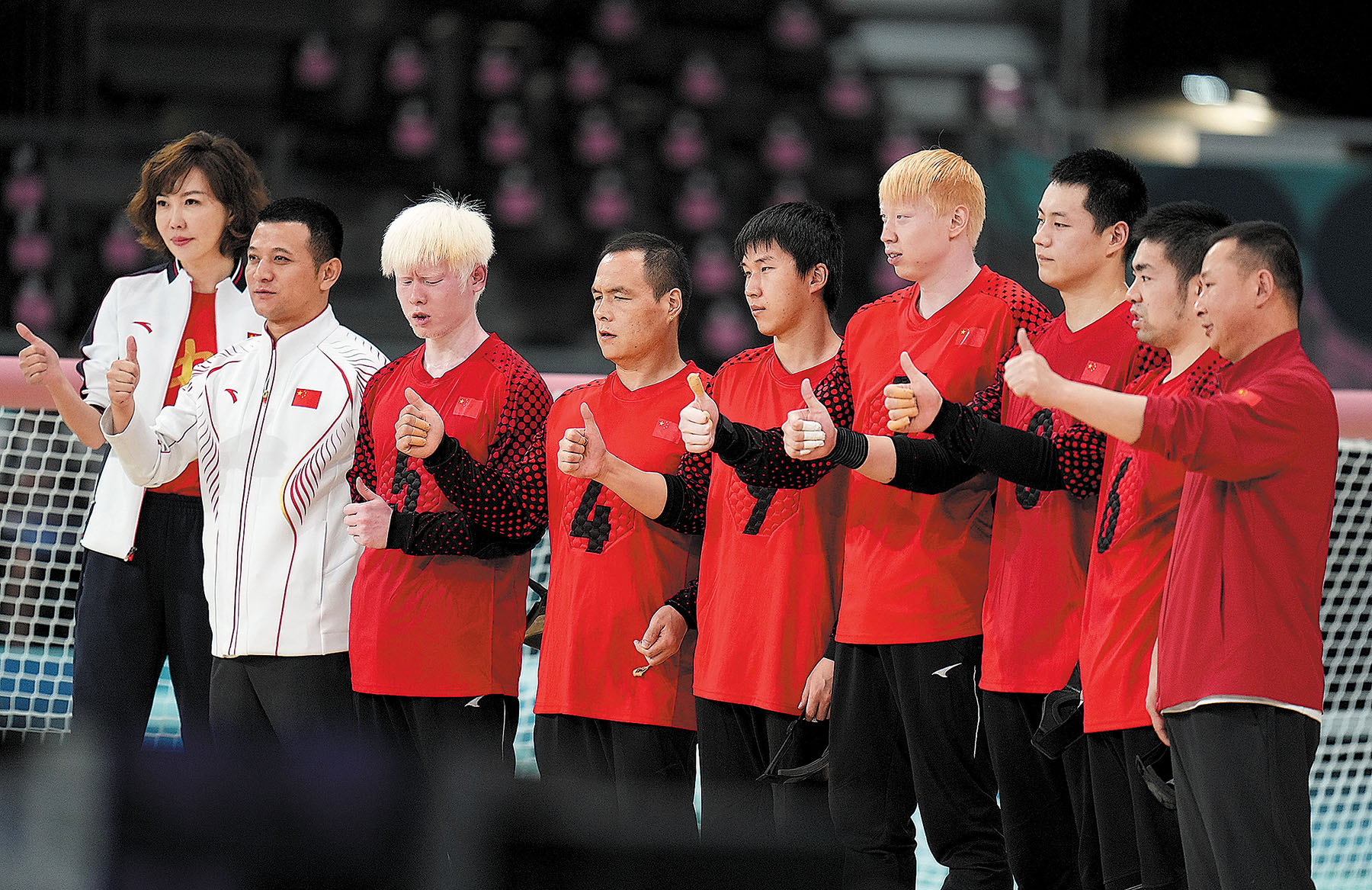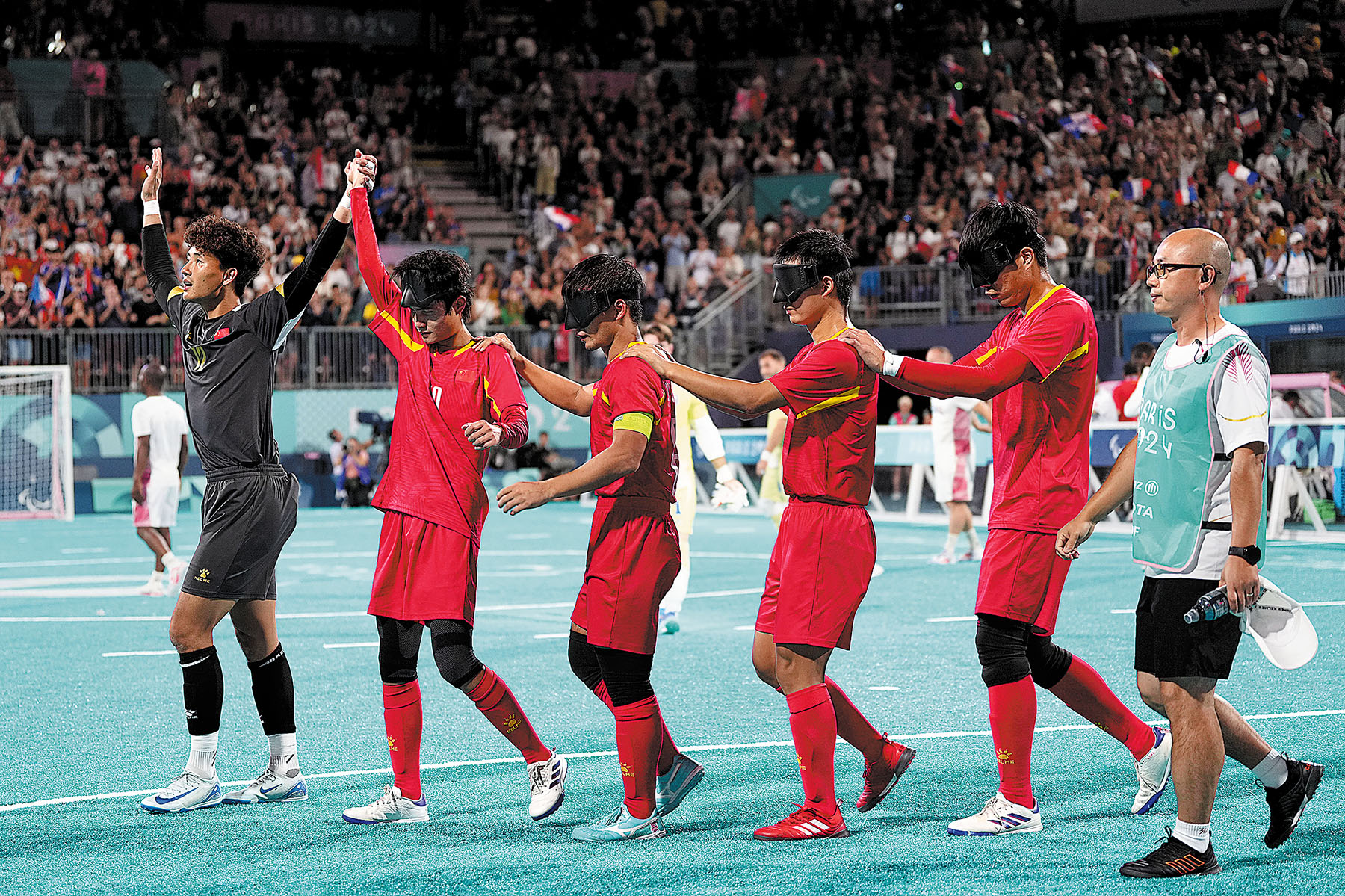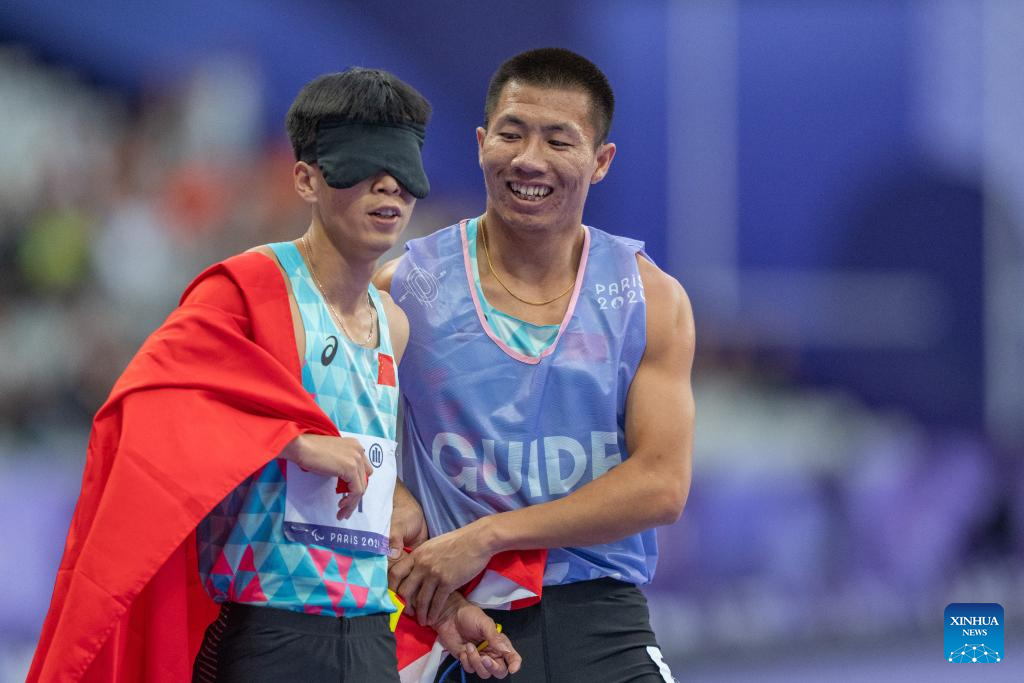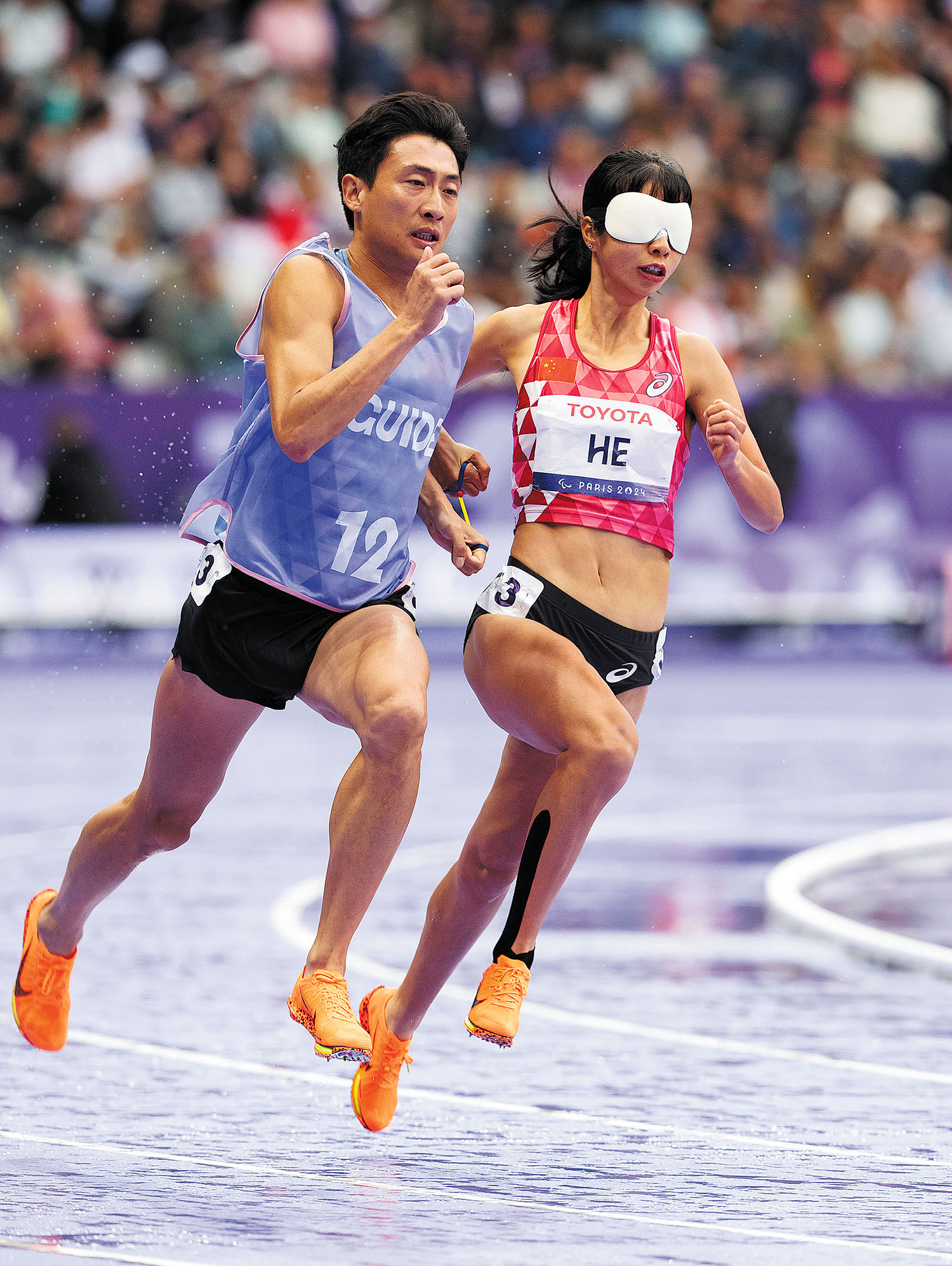Paris 2024 success shows trust, understanding between visually impaired athletes and their ‘eyes’ is crucial

With each call from his coach Wang Lin, Di Dongdong pushed harder, sprinting down the rain-soaked purple track at the Stade de France in Paris.
As the final command echoed, Di leaped, tracing a graceful arc through the air.
His jump of 6.85 meters on Aug 30 not only secured him the gold in the 2024 Paris Paralympics men’s long jump T11 but also shattered a decade-old world record.
“Breaking the world record has always been my goal,” Di said. “The heavy rain, slippery track and chilly temperatures could have been setbacks but today I achieved what I set out to do. I’m overjoyed.”
Di was quick to acknowledge the vital role his coach played in his success. “Coach Wang is like my eyes,” Di said. “With him guiding me, it’s as if I’ve regained my sight, allowing me to run fearlessly and make that leap.”
On the Paralympic stage, visually impaired athletes rely on sighted guides — whether coaches, teammates, or designated assistants — to compete.
These guides act as the athletes’ “eyes” — either running alongside them, leading from the front, or offering support from behind.
Off the track, they are more than just partners in sport; they are friends, often as close as family. Together, they pursue the shared dream of pushing past their limits and achieving greatness.

In the long jump T11 category at the Paris Paralympics, where athletes are entirely blind, every jump is a leap of faith. Di relies solely on the voice of Wang, who stands at the front of the takeoff board, calling out to guide him.
With his eyes covered by a blindfold, Di gauges his direction and pace through the rhythm of Wang’s shouts, adjusting his stride and timing his leap with precision.
Wang explains that he uses the word “lai” (come) because it is the loudest and clearest command he can give.
“I don’t have a set number of times I shout it,” Wang said. “I just match his rhythm, adjusting the pace of my calls as he runs.”
This flawless partnership is the result of years of trust and countless hours of practice. In the darkness of uncertainty, Di and Wang’s connection has been honed over 14 years, a testament to their unwavering dedication and mutual understanding.
Long jump, a sport that demands explosive power and precise technique, presents an even greater challenge for visually impaired athletes.
For these competitors, the risk of injury is heightened, as they rely on guides to navigate the sand pit’s position, depth, and length.
“This skill is developed over many years,” explained Wang, “While an able-bodied athlete might need around 1,000 jumps to perfect their technique, a blind athlete can require up to 10,000 to achieve the same level of proficiency.”
Wang elaborated: “Imagine trying to walk blindfolded — you’d likely struggle to maintain a straight line. Di’s mastery of the long jump took five years of intensive training. His dedication is extraordinary.”

In addition to the long jump, Di also took bronze in the men’s 100m T11 and contested the men’s 400m T11 track events at the Paris Games. He acknowledges that these races present their own set of challenges, particularly in overcoming mental barriers.
“Initially, I lacked focus and confidence. It took rigorous and consistent training to build my skills and self-assurance,” Di said. “I train for four to five hours a day for both events.”
Even though Di has secured gold medals at the past two Paralympic Games, the 31-year-old athlete believes he still has more to offer, and Wang remains steadfast in his support as coach.
“As long as Dongdong is training, I will be there to guide him,” Wang said. “Our partnership will continue.”
Blind soccer presents a unique challenge, where teamwork and communication extend beyond the usual dynamics of the sport.
On the pitch, while coaches issue directional commands from the sidelines, sighted goalkeepers play a dual role. Not only do they protect the goal, but they also serve as vital navigators, helping their teammates with verbal cues to “listen and locate” both the ball and their opponents.
Of China’s 10-man blind soccer squad competing in Paris, two are sighted goalkeepers. One of them, Wu Limin, has been playing for Team China for more than a decade. Over that time he has built a deep bond with the players, through years of shared experience and trust.
“I have learned so much from them,” Wu reflected. “Especially their relentless commitment and their ability to overcome adversity.”
During matches, Wu anchors the defense, while off the field, he leads his teammates, literally, with his guiding presence. As he walks in front, his teammates follow closely, each with one hand placed on the shoulder of the person ahead. “On the field, I am their last line of defense; off the field, I am their guide,” Wu said.

A 10-centimeter rope bridges the gap between He Shanshan and her guide, You Junjie. Prior to a race, You meticulously adjusts the starting blocks and positions them to maximize He’s comfort. As the race unfolds, the pair run in unison, their strides fully synchronized.
While He could not see the purple track of the Stade de France during the women’s 1,500m T11 final on Sept 2, she was able to negotiate the course by relying entirely on her guide. With You’s steady encouragement, they surged toward the finish line together, ultimately stepping onto the podium in second place for a silver medal. Earlier, they had also secured a bronze in the women’s 400m T11 in the same manner.
Despite only being a team for just over a year, 25-year-old He and 28-year-old You have developed a bond akin to that of family. “I consider her like a younger sister,” You said. “I hope she continues to grow and achieve even more through these Paralympic Games.”
Once a promising middle-distance runner himself, You retired from professional athletics in 2021. By early 2023, faced with an uncertain career path, You found unexpected clarity in his new role as a guide for He.
Their partnership began with a breakthrough: Within a month of training together, He surpassed her personal best, sparking a newfound confidence in both runners. To focus on guiding He at the Paralympics, You chose to postpone his graduate studies at Tsinghua University for a year.
While You has never competed on the Olympic stage in his own event, the 1,500m, by supporting He’s Paralympic quest in Paris, in some small way, You has realized his own aspirations.
A silver medalist in the men’s 1,500m at the 2021 National Games, You’s role as a guide has rekindled his passion for running, and he plans to return to competitive racing next year.
For He, who was born blind, running is a formidable challenge. Mastering new techniques requires relentless repetition, as she cannot visualize the movements.
“I might need to practice a new technique hundreds of times before I get it right, but You is never tired of teaching me,” He said. “I trust him deeply, which allows me to run with confidence.”
She noted that 2024 has seen her greatly improve her self-assurance and courage.
“Although I cannot see this vibrant world, Brother You helps me ensure the world sees us,” He added.


